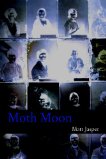Matt Jasper: Moth Moon
In his debut collection Moth Moon, New Hampshire poet Matt Jasper channels the dissociative language of schizophrenia while dexterously avoiding the stultification of "topicality." These are not poems "about" schizophrenia, though Jasper has said the collection was inspired in part by his work with aging schizophrenics in a group home; instead, these poems speak through (not "to," or "of") a population by and large outside our hearing. To call the image-sets in these poems "associative" would be a disservice to Jasper, the collection, and sufferers of schizophrenia, as in fact what Moth Moon exhibits again and again is not the artful leaping from one perception to a distantly related other but a poetics of the prismatic, in which the "truth" of the observable universe is spoken of clearly and unambiguously—but always and only in the idiosyncratic way it is understood by its perceiver. The reader of Moth Moon is asked to reconfigure her sense of literal and figurative language entirely, as the poetic gaze of poems like "A Translation, Purdy Group Home" is the product of neither gritty realism nor a Kantian, neo-Romantic sublimity: "I am standing in the place and the place changes. / I am the changing of the place." Or consider the alternative semiotics, bordering on Mikhail Epstein's notion of the metarealistic in poetry, evident even in one of the collection's more conventional poems, "Fall":
Owl left branch to warn you—
this is the misery of hands
thrown up in despair.
At first only a pair yet one feels
what they clutched at,
caressed.
The warmth remaining
is best remembered
as leaves fall, we gather them—
A harvest which lies unused as
hands contract the disease of falling
with the weight of all they've touched.
The leaves are hands falling past brooms
and rakes now falling too
and we, upon them
completed
not by falling but
by what all falling is toward.
While the rhetorical structure in evidence here is not uncommon, this mode of perception, easily dismissed—and misunderstood—as neo-surrealism, is seen even more vividly in voice-engine poems like "Rorschach Test": "Mice playing. / It means the cat is away. / Means tiny footprints: / feet of adultery upon the clear floor." Russian metarealist Ivan Zhdanov ("The unfinished gesture of a tree—whirlwind") has trod this same ground, privileging the so-called "third trope" ("metabole") over metaphor and metonymy, but we've not seen much writing of this sort emanating from our own shores (though reading Jasper as a young Bill Knott would not be entirely wide of the mark). While the poems in Moth Moon are not uniform in their facility with this particular poetics—Jasper seems most comfortable with shorter forms—he earns kudos for exhibiting such fidelity to the differential sight of his subjects. So often these poems disassemble wholes (including the presumptive "whole" of the self) in ways a more conventional eye would likely euphemize or romanticize.
This poetry would be bardic if it weren't the detritus of actual experience; it would be journalistic were it not so resolute in reporting the "facts" as they are not. And yet the imagery of Moth Moon, which of course is not "imagery" but the moment-to-moment perception of several plausible speakers, asks us to reconsider not only how language means but why it means. If reading Jasper's poetry prompts the all-too-easy conclusion that there is more than one way to skin a cat, it is only because that cat is a raven and its skin is suffocating. These poems see threat in shapes and make no distinction between either side of a metaphor (the originary term or the resultative); they project and deflect agency casually; they reconnect neural networks long in disuse and discover in extant phenomena new constellations of significance to which any reader would do well to pay attention.
 Matt Jasper
Matt Jasper